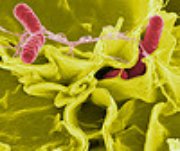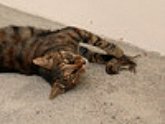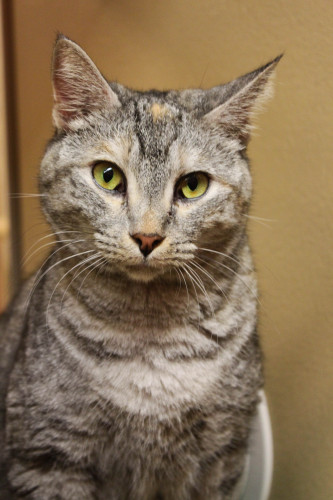Salmonella and Pets
Here you will find important facts about salmonella and pets. Salmonella enterocolitis, also called salmonellosis, is a bacteria that cause inflammation of the small intestines. This bacteria lives in the intestinal tracts of many species of mammals, birds, amphibians and reptiles. Therefore, cats can also contract salmonella and can be passed on to other animals, including humans. However, there are very few reports of humans contracting such infection from cats.
According to Veterinary literature such as ‘The Cornell Book of Cats’ or ‘Feline and Canine Infectious Diseases’ cats are “…extremely resistant to experimental infection with salmonella spp. and clinical salmonellosis is uncommon in cats”. “… few references [to salmonellosis in cats] exist in the scientific literature”.
“Contamination can arise from rodent and bird feces, raw or under-cooked contaminated meat and table scraps, or commercially prepared foods that are contaminated during processing.”

Cats can contract salmonella by eating contaminated food, drinking contaminated water, or catching infected animals, such as birds and rodents. In most cases, cats infected with salmonella do not display any symptoms of the disease.
Although, cats with weak immune systems, general poor health, and kittens are more likely to be clinically affected than adult cats. The time between infection and symptom development is 8 and 48 hours in humans and 2 to 4 days in cats. Symptoms include: abdominal pain, chills, diarrhea, fever, vomiting, nausea, dehydration, and muscle pain.
Your veterinarian can determine if your cat has contracted this bacteria by simply collecting bacterial cultures from the cat's rectum or fresh feces. This is a very similar test that doctors would perform in humans, although your doctor may also request a complete blood count with differential, blood culture, and/or test for specific antibodies.
Treating salmonella in humans is similar to treating cats, the goal is to replace fluids and electrolytes lost by diarrhea. In case of severe diarrhea, your doctor may recommend intravenous fluids. Anti-diarrhea medications are generally not recommended because they may prolong the infection.
Preventing salmonella contamination is quiet simple, do not feed your cat infected raw meat, purchase good quality commercial dry cat food, and keep him/her indoors. If you can't keep your cat indoors, make sure you take your cat to the Vet periodically, for routine checkups and vaccinations.
In addition, after handling your cat's bowls, and cleaning the cat litter, you should wash your hands with soap and warm water.
Since this bacteria is more likely to be contracted by handling food, be sure to wash your hands prior and after handling meat, specially chicken. Additionally, make sure you wash your hands after using the bathroom, and other public facilities.
Also, if you own a reptile, be sure to wear gloves when handling the animal or its feces because he can easily pass salmonella to humans.
For more information about salmonella and pets, click here.
Return from Salmonella and Pets to Cat Scratch Disease
Return from Salmonella and Pets to Our Home Page
New! Comments
Have your say about what you just read! Leave me a comment in the box below.Healthy Cat Treat

Subscribe to Our Love Cats Digest e-zine
"A cat improves the garden wall in sunshine, and the hearth in foul weather." - Judith Merkle Riley
Marketing Strategies by










New! Comments
Have your say about what you just read! Leave me a comment in the box below.